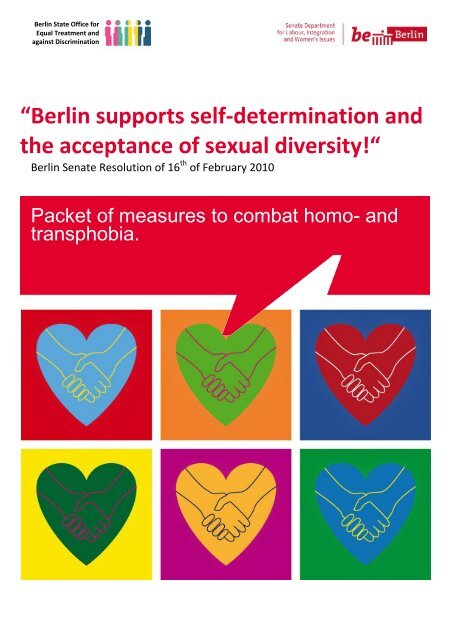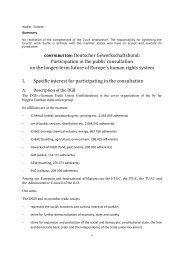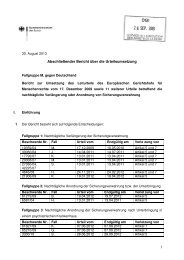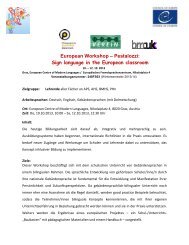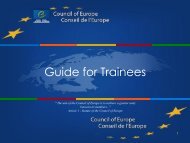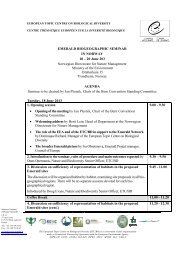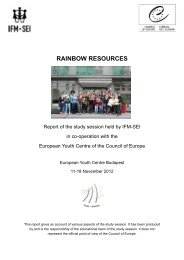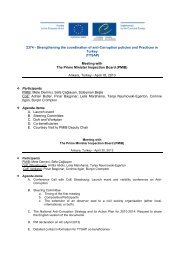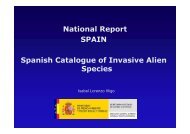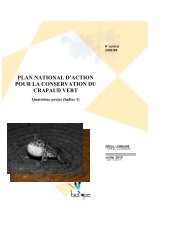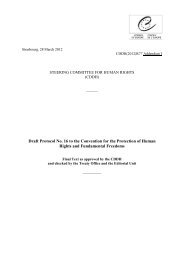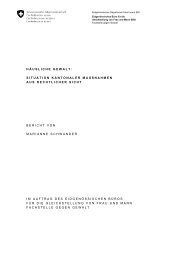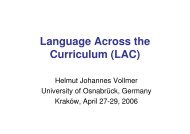Berlin Action Plan against Homophobia and Transphobia
Berlin Action Plan against Homophobia and Transphobia
Berlin Action Plan against Homophobia and Transphobia
Create successful ePaper yourself
Turn your PDF publications into a flip-book with our unique Google optimized e-Paper software.
<strong>Berlin</strong> State Office for<br />
Equal Treatment <strong>and</strong><br />
<strong>against</strong> Discrimination<br />
“<strong>Berlin</strong> supports self-determination <strong>and</strong><br />
the acceptance of sexual diversity!“<br />
<strong>Berlin</strong> Senate Resolution of 16 th of February 2010<br />
Packet of measures to combat homo- <strong>and</strong><br />
transphobia.
Index<br />
I. Background/Purpose ............................................................................................ 3<br />
II. Status Report ....................................................................................................... 3<br />
III. Objective ............................................................................................................. 3<br />
IV. Concrete Implementation / Programmes <strong>and</strong> Measures .................................. 4<br />
Strengthening Information <strong>and</strong> Education .......................................................... 5<br />
Combating Discrimination, Violence <strong>and</strong> Hate Crimes ....................................... 9<br />
Driving Forwards Change in the Administration ............................................... 13<br />
Improving Knowledge ........................................................................................ 15<br />
Promoting Dialogue ........................................................................................... 16<br />
Achieving Nationwide Legal Equality ................................................................. 18<br />
AH Resolution 23 ........................................................................................... 18<br />
V. Benefit ............................................................................................................... 21<br />
VI. Complementary Initiatives ............................................................................... 21<br />
VII. Budgetary Impact ............................................................................................ 23<br />
2
The "<strong>Berlin</strong> supports self-determination <strong>and</strong> the<br />
acceptance of sexual diversity“ Initiative<br />
Package of measures to combat homophobia<br />
<strong>Berlin</strong> Senate Resolution of 16 th February 2010<br />
I. Background/Purpose<br />
On 2 April 2009, the <strong>Berlin</strong> House of Representatives agreed on the "<strong>Berlin</strong> supports selfdetermination<br />
<strong>and</strong> the acceptance of sexual diversity“ Initiative (Official Record<br />
16/2291). The <strong>Berlin</strong> State Office for Equality <strong>and</strong> Against Discrimination (LADS) in the<br />
Senate Department for Integration, Labour, <strong>and</strong> Social Services took on the overall responsibility<br />
for implementing the Initiative, coordinating the activities <strong>and</strong> programmes<br />
of the responsible Senate departments <strong>and</strong> the numerous civil society actors integrated<br />
into the process. The present package of measures on implementing the Senate resolution<br />
was developed in a steering round-table <strong>and</strong> five inter-departmental working<br />
groups.<br />
II. Status Report<br />
The Status Report looked at activities <strong>and</strong> projects in the area of same-sex lifestyles related<br />
to the resolution's policy fields. The findings showed that the present range of<br />
programmes in <strong>Berlin</strong> is not adequate to sustainably dismantle homophobic <strong>and</strong> transphobic<br />
attitudes <strong>and</strong> behaviour. In this context, the responsible Senate departments<br />
joined non-governmental organisations (NGOs) to jointly discuss concepts <strong>and</strong><br />
measures. Their meetings resulted in particular in a call for further developing a programme<br />
of differentiated <strong>and</strong> specific target-group measures. The resulting package of<br />
programmes builds on the decentralised potential which has grown over the years <strong>and</strong><br />
which provides the basis for the Initiative's implementation. The package of programmes<br />
usefully supplements existing activities <strong>and</strong> measures already supported by<br />
the Senate.<br />
III. Objective<br />
The Initiative, passed unanimously by the House of Representatives, aims at launching a<br />
comprehensive process of analysing <strong>and</strong> confronting homophobia in society <strong>and</strong> securing<br />
a positive change towards tolerance, acceptance <strong>and</strong> respect of sexual diversity.<br />
In addition to the initiatives on the equal legal status of marriage <strong>and</strong> registered partnerships<br />
between same-sex couples, the Senate also welcomes the House of Represent-<br />
3
atives' Initiative on effectively combating homophobia <strong>and</strong> encouraging respect for a<br />
culture of sexual diversity. The Senate regards the "Initiative on Sexual Diversity" as a<br />
crosscutting task in the <strong>Berlin</strong> administration. This is in compliance with the voluntary<br />
commitment given by <strong>Berlin</strong> on signing the "Charter of Diversity". <strong>Berlin</strong> is predestined<br />
to be especially involved in a proactive approach to diversity <strong>and</strong> actively campaign<br />
<strong>against</strong> discrimination within Europe.<br />
The Initiative is directed to everyone living in <strong>Berlin</strong>. Although the programmes <strong>and</strong><br />
measures in the Initiative cannot enforce an acceptance of sexual diversity, they are<br />
nonetheless designed to help citizens learn to positively value the diversity of people<br />
living in <strong>Berlin</strong> – <strong>and</strong> the diversity of their sexual lifestyles.<br />
IV. Concrete Implementation / Programmes <strong>and</strong><br />
Measures<br />
Inter-departmental working groups under the overall responsibility of the Senate Department<br />
for Integration, Labour, <strong>and</strong> Social Services the <strong>Berlin</strong> State Office for Equality<br />
<strong>and</strong> Against Discrimination (LADS) were set up to implement the abovementioned Resolution<br />
passed by the <strong>Berlin</strong> House of Representatives.<br />
The Senate Departments for Education, the Interior, <strong>and</strong> Justice as well as the Senate<br />
Chancellery were involved on the administrative level. A comprehensive package of programmes<br />
<strong>and</strong> measures has been developed in a very intensive, open <strong>and</strong> participatory<br />
process of coordination involving the independent bodies working in this area.<br />
In implementing the programmes <strong>and</strong> measures, a considerable emphasis is put on a<br />
creating a network between the administrations <strong>and</strong> the social actors.<br />
Since the present report references the decision by the House of Representatives, it is<br />
structured into the following fields of action:<br />
1. Strengthening Information <strong>and</strong> Education<br />
2. Combating Discrimination, Violence <strong>and</strong> Hate Crimes<br />
3. Driving Forwards Change in the Administration<br />
4. Improving Knowledge<br />
5. Promoting Dialogue<br />
6. Supporting Legal Equality to Achieve Nationwide Acceptance<br />
In several fields of action, the responsibility for implementing the goals is borne by other<br />
actors aside from the administration. In some cases, this responsibility lies entirely within<br />
the area of expertise of third parties. Where the administration cannot achieve the<br />
goals alone, the implementation of the objectives in the "<strong>Berlin</strong> supports selfdetermination<br />
<strong>and</strong> the acceptance of sexual diversity“ Initiative is to be pursued either<br />
within existing cooperations or ones to be launched, using a process of proposals <strong>and</strong><br />
professional exchange.<br />
4
Successfully implementing the package of programmes <strong>and</strong> measures requires interdepartmental<br />
cooperation. The requisite cooperations are planned within a framework<br />
of working groups, expert discussions <strong>and</strong> conferences during the implementation of the<br />
proposed programmes. The individual reports commissioned by 31.12.2010 as specified<br />
in the parliamentary resolution are to be prepared by the Senate Department for Integration,<br />
Labour, <strong>and</strong> Social Services or the specifically responsible Senate Departments<br />
working together with the Senate Department for Integration, Labour, <strong>and</strong> Social Services.<br />
Implementing the Initiative has been made possible through the ratification of the<br />
2010/11 Budget <strong>and</strong> the pertinent funding provided for within that Budget.<br />
Strengthening Information <strong>and</strong> Education<br />
The envisaged programmes <strong>and</strong> measures are intended to create a foundation in school<br />
<strong>and</strong> youth work for perceiving, dismantling <strong>and</strong> preventively averting discrimination,<br />
harassment <strong>and</strong> violence on the basis of various characteristics – especially in respect to<br />
the prejudices <strong>against</strong> lesbians, gay men, bisexuals, transsexuals, <strong>and</strong> intersexuals<br />
(LGBTI). The objective is to constructively deal with difference.<br />
As a first step, this requires a comprehensive evaluation on the implementation of curricula<br />
guideline AV 27 (General Note on the Curricula: Sex Education) as well as the programmes<br />
on democracy education as they relate to homophobia / sexual diversity. The<br />
information materials in individual subjects <strong>and</strong> interdisciplinary lessons will be brought<br />
up to date. In line with a top-down strategy, key people working in the educational sector<br />
<strong>and</strong> pedagogical experts are to receive skills training on diversity <strong>and</strong> sexual diversity.<br />
On the basis of best practice examples, the concepts, st<strong>and</strong>ards <strong>and</strong> guidelines for<br />
youth facilitates, schools <strong>and</strong> further training institutions are to be further developed.<br />
In general, the Senate Department for Education, Science <strong>and</strong> Research is overseeing<br />
the implementation of programmes <strong>and</strong> measures in this field of action.<br />
House of Representatives (AH) Resolution 1<br />
Programme Title: Evaluating the Interdisciplinary Implementation of AV 27 (Sex<br />
Education) <strong>and</strong> Democracy Education in Respect of <strong>Homophobia</strong>/Sexual Diversity<br />
To provide a representative overview of the current situation, an external evaluation is<br />
to be commissioned in cooperation with a University. The evaluation will employ an<br />
activating survey of those in responsible positions (head teachers, teachers, parents,<br />
pupil representatives) in schools for all ages of pupils.<br />
AH Resolution 2<br />
Programme Title: Diversity Training <strong>and</strong> Skills for Key Persons <strong>and</strong> Pedagogical<br />
Specialists<br />
The key persons in the schools are:<br />
5
everyone with a management function (head teachers, deputy heads, coordinators,<br />
heads of departments)<br />
everyone with an advisory function (advisory <strong>and</strong> liaison teachers, drug abuse officers,<br />
violence prevention officers, heads of the mediator working groups, school<br />
psychologists, school social workers, etc.)<br />
Key persons in School Administration in the Senate Department for Education, Science<br />
<strong>and</strong> Research as well as the State Institute for School <strong>and</strong> Media (LISUM)<br />
School developers, school inspectors<br />
Expert round-tables<br />
Disseminators in regional advanced training<br />
The key persons in child <strong>and</strong> youth welfare are:<br />
AG BÖJ (<strong>Berlin</strong> Public-Sector Youth Welfare Working Group)<br />
Group of Youth Town Councils<br />
Heads of Youth Departments<br />
Directors of Youth Welfare Offices<br />
Regional Heads<br />
Main Expert Round-Tables (Children <strong>and</strong> youth facility managers in a borough)<br />
Working Groups, e.g., pursuant to § 78 Child <strong>and</strong> Youth Welfare Act (KJHG)<br />
Daycare Centre Experts<br />
Offices of Child <strong>and</strong> Youth Work<br />
Experts in the education sector <strong>and</strong> child <strong>and</strong> youth welfare are to receive further training<br />
<strong>and</strong> skills courses in diversity (age, sex, sexual identity, disabilities, ethnicity, religion,<br />
world view, social affiliation).<br />
Pedagogical experts in the schools area are to receive further training. There is also to<br />
be similar further training available for pedagogical experts working in child <strong>and</strong> youth<br />
welfare. Moreover, voluntary youth leaders are to receive further training as well. In<br />
addition, the youth leader training st<strong>and</strong>ards (JuleiCa st<strong>and</strong>ards) in sexual diversity are<br />
to be scrutinized <strong>and</strong> checked.<br />
AH Resolution 3<br />
Programme Title: Enabling Teachers to Deal Pedagogically with Diversity <strong>and</strong><br />
Sexual Diversity as Part of Their Training<br />
Providing teachers with the pedagogical skills to deal with diversity <strong>and</strong> sexual diversity<br />
in:<br />
6
A) Basic Training: The topics are to be implemented in the training curricula in universities,<br />
universities of applied sciences, <strong>and</strong> technical colleges. M<strong>and</strong>atory modules on sex<br />
education (incl. LGBTI lifestyles) <strong>and</strong> diversity are to be introduced into the first phase of<br />
teacher training. The academic staff working in educational theory at universities, universities<br />
of applied sciences, <strong>and</strong> technical colleges are to receive further training <strong>and</strong><br />
these institutions provided with consultancy services.<br />
B) Practical Training (probationary training period): M<strong>and</strong>atory modules taking a real-life<br />
approach to sex education including LGBTI lifestyles, homophobia (also as a part of violence<br />
prevention) <strong>and</strong> diversity are to be implemented in the general practical teaching<br />
course in the second phase of teacher training (probationary training period). Curricula<br />
implementation is to be dealt with in the specialist seminars, as is the subject-specific<br />
implementation of the AV 27 curriculum guideline.<br />
In addition, particular target-group measures such as workshops on implementing diversity<br />
within the student body (with the pupil representatives) are to be adopted. Analogously,<br />
there are also to be workshops <strong>and</strong> activities for young people working in youth<br />
welfare.<br />
Instigating parent liaison is to be a further supplementary measure. Themed parents'<br />
evenings with professional consultants in attendance are intended to heighten awareness<br />
of the topic of lesbian/gay young people <strong>and</strong> reduce parental fears. This will additionally<br />
be supported by establishing parent self-help groups.<br />
AH Resolution 4<br />
Programme Title: Providing Materials <strong>and</strong> Contact Partners for Diversity <strong>and</strong><br />
Sexual Diversity<br />
The existing information materials for specific age <strong>and</strong> target groups are to be reviewed<br />
<strong>and</strong> edited to ensure they are easily accessible. In addition, supplementary materials are<br />
to be produced, e.g., brief information <strong>and</strong> teacher's notes on "Homophobic Harassment".<br />
Moreover, information newsletters in the various subjects, parent newsletters,<br />
films, downloadable teaching materials, multimedia services (detailed PowerPoint<br />
presentations) are to be made available for PTA <strong>and</strong> staff meetings <strong>and</strong> pupil representatives.<br />
A job outline for a Diversity Officer or contact partner for sexual diversity is to be drafted,<br />
with a description of the required qualifications <strong>and</strong> the tasks of the job. In addition,<br />
peer educators on sexual diversity are to established <strong>and</strong> trained.<br />
AH Resolution 5<br />
Programme Title: Principles, Concepts, St<strong>and</strong>ards<br />
General overall principles are to be developed on the basis of best practices. All in all,<br />
examples of best practice are to be appropriately acknowledged <strong>and</strong> incentives created<br />
to promote sexual diversity (e.g., via committees, prizes).<br />
The school inspection <strong>and</strong> monitoring bodies are to check the school programmes:<br />
7
Analysing the school with reference to how far it deals with "diversity, with special<br />
consideration given to the topic of sexual diversity"<br />
Exp<strong>and</strong>ing the inspection <strong>and</strong> quality checklist<br />
Providing support on developing school programmes<br />
Aligning support criteria for independent schools (private schools)<br />
Updating emergency plans<br />
General principles are also to be developed in child <strong>and</strong> youth welfare facilities. Giving<br />
due consideration to the topic of diversity <strong>and</strong> in particular sexual diversity is to be included<br />
as a mark of quality in <strong>Berlin</strong> youth work.<br />
AH Resolution 6<br />
Programme Title: Documenting <strong>and</strong> Constructing History<br />
A dedicated educational project is to support independent agencies <strong>and</strong> programmes<br />
providing historical documentation <strong>and</strong> promote exhibitions. This includes:<br />
1. Incorporating the not-for-profit Schwules Museum (Gay Museum) in institutional<br />
funding from 2010 (see Senate Resolution of 07.07.2009)<br />
2. Giving due weight to a presentation of the Nazi regime's persecution of homosexuals<br />
<strong>and</strong> other groups of victims in the design <strong>and</strong> planning of the 20th-century exhibition<br />
area in the Stiftung Stadtmuseum at its future Marinehaus location.<br />
3. A section "In Memory of the Nazi's Victims“<br />
4. A new website www.orte-der-erinnerung.de<br />
5. A permanent exhibition at the Sachsenhausen Memorial <strong>and</strong> Museum<br />
AH Resolution 7<br />
Programme Title: Promoting the Acceptance of Sexual Diversity in Care <strong>and</strong><br />
Residential Facilities as well as Facilities for Senior Citizens<br />
The acceptance of sexual diversity is similarly to be promoted in care <strong>and</strong> residential<br />
facilities as well as facilities for senior citizens. Since these measures impact numerous<br />
crosscutting issues, the Senate Department for Integration, Labour, <strong>and</strong> Social Services<br />
intends to contribute using the existing instruments available <strong>and</strong> in cooperation with<br />
the pertinent actors:<br />
1. Framework contract pursuant to § 79 Clause 1, German Code of Social Law (SGB)<br />
Book XII.<br />
The contract with the service providers could be supplemented in the spirit of the objectives<br />
either in the Preamble or at another suitable place. The LIGA associations have<br />
reacted positively to the preparatory discussions in the Contract Commission (KOM 75).<br />
2. Nursing Care Committee (L<strong>and</strong>espflegeausschuss)<br />
8
The intention is to contact the Chair of the Committee in order to have the topic put on<br />
the agenda at one of the next Committee meetings.<br />
3. Senior Citizens Policy Guidelines<br />
Consideration is being given to the possibility of supplementing the guidelines with requisite<br />
objectives.<br />
4. Contracts with LIGA <strong>and</strong> Borough Centres<br />
When contracts are renewed, appropriate consideration will be given to additions reflecting<br />
the objectives. The topic has been introduced into existing committees <strong>and</strong> will<br />
be taken up or taken up again, as applicable, during the process of contract renewal.<br />
5. Long-term Care Support Centre / "Rund ums Alter" Coordination Office<br />
<strong>Plan</strong>s have been made to actively include the long-term care support centre in the Initiative<br />
process.<br />
6. <strong>Berlin</strong>'s "Act on Forms of Residential Living <strong>and</strong> Participation" (WTG) is intended<br />
to serve to protect the elderly, those in need of nursing care, or adults with disabilities<br />
who are living in particular forms of residential care. The Act is especially directed to<br />
preserving their cultural, religious, gender <strong>and</strong> sexual identify <strong>and</strong> self-determination<br />
<strong>and</strong> protecting them from sexual harassment.<br />
Combating Discrimination, Violence <strong>and</strong> Hate Crimes<br />
For some years, <strong>Berlin</strong> has experienced a high level of violence <strong>against</strong> transsexuals <strong>and</strong><br />
homosexuals, whereby one can assume that many incidents in this area go unreported.<br />
<strong>Berlin</strong> is an open <strong>and</strong> tolerant city where hate crimes must be fought with every possible<br />
constitutional means available. At the same time, there needs to be positive signs given<br />
for the acceptance of same-sex lifestyles. Lesbians, gay men, <strong>and</strong> transsexual <strong>and</strong> intersexual<br />
people (LGBTI) are to be supported by empowerment programmes. Victims of<br />
violence <strong>and</strong> discrimination are to be provided with extensive <strong>and</strong> skilled advisory services;<br />
refuges are to be provided for LGBTI in crisis situations.<br />
AH Resolution 8<br />
Programme Title: <strong>Berlin</strong> Campaign to Create Public Awareness<br />
There is to be a <strong>Berlin</strong>-wide campaign on "sexual diversity“ in the form of TV commercials,<br />
posters, flyers, publications <strong>and</strong> events. In detail, the campaign is to include:<br />
Image adverts:<br />
Suitable subjects are to be photographed for the image adverts used by BTM <strong>and</strong> Partner<br />
for <strong>Berlin</strong>. In addition, an agency is to be commissioned to develop motifs <strong>and</strong> adverts<br />
are to be placed (especially) in international LGBTI media. This will also have the<br />
side effect of significantly improving the image of tourism, which is such an important<br />
factor.<br />
9
Year/Week/Day of Sexual Diversity:<br />
In this period, effective publicity measures could be realised (events, festivals, information<br />
days at schools <strong>and</strong> youth facilities, competitions, etc.); these are supplementary<br />
to such existing activities as the Day Against <strong>Homophobia</strong>.<br />
Posters:<br />
An advertising agency is to design emotionally expressive posters with a strong direct<br />
appeal which can then be effectively displayed as publicity at city railway <strong>and</strong> subway<br />
stations <strong>and</strong>, if appropriate, at other places as well.<br />
Poster Competition:<br />
A poster competition on "sexual diversity" with a public prize-giving ceremony is to be<br />
launched for <strong>Berlin</strong> school pupils. The prize-winning posters could be displayed in the<br />
city railway <strong>and</strong> subway stations. The pictures submitted could be used to produce publications<br />
for multipliers <strong>and</strong> others interested, <strong>and</strong> also be used as teaching materials in<br />
schools.<br />
Writing Competition:<br />
A creative writing competition on "sexual diversity" with a public prize-giving ceremony<br />
is to be launched for <strong>Berlin</strong> school pupils. The stories submitted could be used to produce<br />
publications for disseminators <strong>and</strong> others interested, <strong>and</strong> also be issued as teaching<br />
materials in schools.<br />
AH Resolution 9<br />
Programme Title: Empowerment <strong>and</strong> Moral Courage<br />
<strong>Berlin</strong> civil society actors are to be strengthened in their commitment to sexual diversity<br />
– a measure also designed to play a part in supporting decisive intervention in cases of<br />
LGBTI discrimination.<br />
1. Awareness-raising Activities: Prevention<br />
Producing multilingual information leaflets <strong>and</strong> online media<br />
Training courses <strong>and</strong> information programmes in psychosocial professional groups,<br />
focusing especially on the multiple discrimination faced by lesbians/transidentity<br />
people.<br />
Low threshold awareness-raising in the "intercultural gay community". Targeted<br />
information <strong>and</strong> advice services <strong>and</strong> advertising of existing support <strong>and</strong> help services.<br />
Educational campaigns are to be used to motivate injured parties or witnesses to<br />
report incidents to the police <strong>and</strong> press charges. Only when more is known about<br />
the estimated number of undetected cases will it be possible to react adequately to<br />
the situation, e.g., by increased presence at locations noted for incidents.<br />
To improve the reporting of cases <strong>and</strong> change negative attitudes towards people<br />
with a migration background, there is a pressing need for "inward" communication<br />
with different life-worlds <strong>and</strong> cultures.<br />
10
2. Awareness-raising/Strengthening LGBTI<br />
The aim of the requisite measures is to buttress <strong>and</strong> anchor an awareness of discrimination<br />
in the LGBTI life-worlds <strong>and</strong> strengthen resistance <strong>against</strong> discrimination. The individual<br />
activities will involve information <strong>and</strong> awareness-raising campaigns in LGBTI organisations,<br />
initiatives <strong>and</strong> their environs. This package of measures explicitly includes<br />
lesbian anti-violence projects.<br />
3. Training courses for multipliers on dealing with homophobia <strong>and</strong> transphobia.<br />
To increase the prevention of violence <strong>and</strong> promote moral courage, interested people<br />
from <strong>Berlin</strong> are to be trained as multipliers <strong>and</strong> take part in two-day courses to become<br />
familiar with de-escalation strategies for homophobia <strong>and</strong> transphobia. The aim is also<br />
to have an influence in football fan clubs, youth clubs <strong>and</strong> (sports) associations.<br />
AH Resolution 10<br />
Programme Title: Police Training<br />
There is a need for police training, including courses on the civil law aspects of the General<br />
Equal Treatment Act (AGG). External personnel support would be useful in ensuring<br />
an effective approach to training.<br />
AH Resolution 11<br />
Programme Title: Prevention of Violence in the Community<br />
There is an urgent need for an "inward" communication to improve the readiness to<br />
press charges <strong>and</strong> counteract any "backsliding“ in attitudes towards people with a migration<br />
background.<br />
AH Resolution 12<br />
Programme Title: Victim's Sense of Security in Criminal Proceedings<br />
The Second Reform Act on Victims' Rights (2. Opferrechtsreformgesetz) of 29 July 2009,<br />
which came into force on 1 October 2009, has already significantly improved the protection<br />
of injured parties in judicial inquiries <strong>and</strong> criminal proceedings by strengthening the<br />
rights of the victims <strong>and</strong> witnesses in criminal cases. This also led, for example, to<br />
changes in § 68 <strong>and</strong> § 200 of the German Code of Criminal Procedure (StPO).<br />
Witnesses are to be allowed to give their business address or place of employment or<br />
another summonable address instead of their place of residence if there is a reasonable<br />
concern that giving the place of residence shall lead to a violation of the witnesses' legal<br />
interests or that of another person or an unfair influence shall be exercised on witnesses<br />
or another person. In this case, the presiding judge at the main proceedings may allow<br />
witnesses not to name their place of residence. Witnesses can also ask to "exchange"<br />
the address of their place of residence with another address in retrospect if there should<br />
be a danger to them only after the examination is concluded. The documents avouching<br />
for the location of the witnesses' place of residence are held by the public prosecutor's<br />
office. They are only to be taken into the files when there is no longer any grounds for<br />
concern over an exposure to danger. In addition, irrespective of any threatening situation,<br />
the criminal prosecution authorities are no longer required to include the complete<br />
address of witnesses in the charge.<br />
11
When bringing charges, victims are to be informed about their rights by the police or the<br />
public prosecutor's office or the local court prosecutor's office <strong>and</strong> provided with information<br />
about victim assistance facilities <strong>and</strong> their services.<br />
AH Resolution 13<br />
Programme Title: Victim Protection<br />
1. Victim Care: Over the last years, the need for victim care has been steadily growing<br />
<strong>and</strong> will increase further as a result of empowerment.<br />
2. Psychological counselling for victims of violence: This service is designed for all<br />
LGBTI people <strong>and</strong> their relatives who have been involved in violent incidents. Initial<br />
discussions <strong>and</strong> psychological counselling are intended to help develop strategies<br />
for coping in everyday life.<br />
3. Further training for psychologists on therapeutic work with victims of transphobic<br />
<strong>and</strong> homophobic violence, <strong>and</strong> on network building: The courses are designed for<br />
registered therapists interested in advanced training on homophobic violence <strong>and</strong><br />
(post) trauma. The objective is to establish a network of cooperating, independent<br />
therapists <strong>and</strong> provide fast access for victims of homophobic violence to capable<br />
registered therapists.<br />
4. Crisis accommodation for victims of transphobic <strong>and</strong> homophobic violence: Frequently,<br />
clients who have experienced homophobic violence or are threatened by<br />
such violence have no place of refuge. This programme sets out to enable them to<br />
escape a violent milieu by providing short-term accommodation in an assisted<br />
community with socio-pedagogical counselling. The accommodation is only intended<br />
for a limited period. This is designed as an interim solution until a permanent solution<br />
can be found with the help of the organisation's staff. The programme is also<br />
specifically aimed at homosexual young people with a migration background who,<br />
due to their sexual orientation, find themselves threatened with domestic violence,<br />
forced marriage or other repressive measures.<br />
5. Intervention in cases of violence <strong>and</strong> discrimination experienced by lesbians or<br />
transidentity people.<br />
Secondary prevention (intervention): Stabilising lesbian <strong>and</strong> transidentity people<br />
with different cultural backgrounds who have experienced violence or discrimination,<br />
developing further strategies of action, preventing damage to<br />
health <strong>and</strong> supporting empowerment.<br />
Tertiary prevention (aftercare): Preventing long-term damage to health from<br />
physical <strong>and</strong> psychological violence/discrimination, elaborating strategies for<br />
action through a (multilingual) hotline (by telephone, email, personally) including<br />
personal counselling <strong>and</strong> case management. Information events (community<br />
relations) are also to be held for violence protection experts to provide further<br />
training/awareness-raising on issues of violence <strong>against</strong> women, lesbians,<br />
transsexuals <strong>and</strong> intersexuals.<br />
12
AH Resolution 14<br />
Programme Title: Collecting Statistical Data<br />
Collecting data on offences <strong>against</strong> sexual self-determination <strong>and</strong> diversity in the police<br />
criminal statistics would not result in greater criminological knowledge.<br />
"Hate crime" offences belong to politically motivated crimes <strong>and</strong> are sufficiently recorded<br />
under the "criminal registration system for politically motivated criminality" (KPMD-<br />
PMK). The KPMD-PMK database contains records of offences at a time close to the<br />
charges being brought. It offers a reliable database for evaluation, statistical evidence,<br />
criminological research <strong>and</strong> for the decisions taken by the executive <strong>and</strong> criminal investigation<br />
department. In other respects, even simply recording the perpetrator's motive<br />
in the police data processing system in each individual case would, in many instances,<br />
allow inferences to be drawn about the victim's sexual orientation <strong>and</strong> this data could<br />
then, via search functions, be accessed in an individualised form. By introducing the<br />
POLIKS networked process platform, the police consciously decided <strong>against</strong> any such<br />
personalised evaluation of real or alleged qualities of victims in order to exclude potential<br />
misuse from the outset.<br />
AH Resolution 15<br />
Programme Title: Effective Prosecution under Criminal Law <strong>and</strong> the Law of<br />
Criminal Procedure<br />
In prosecuting homophobia-motivated criminality, the appropriate utilization <strong>and</strong> resolute<br />
application of criminal law <strong>and</strong> the law on criminal procedure is assured.<br />
Driving Forwards Change in the Administration<br />
As early as 2007, when <strong>Berlin</strong> became a signatory of the "Charter of Diversity", the city<br />
undertook to cultivate an administrative culture marked by respect. Moreover, in the<br />
2006 coalition agreement, the Senate already reached a consensus on developing diversity<br />
guidelines for the public sector. The guidelines to be developed are intended to express<br />
the administration's particular respect for its staff. In addition, the Senate would<br />
like to offer an example for other employers in <strong>Berlin</strong> (Coalition Agreement, Point 19).<br />
To draw closer to the objective of a discrimination-free administration, staff training<br />
courses are proposed, especially for those in leadership positions. The courses are to be<br />
structured around the diversity approach <strong>and</strong> especially focused on sexual identity.<br />
In personnel policy, diversity aspects should be included in the recruitment process <strong>and</strong><br />
personnel development plans. Training courses to promote diversity expertise should<br />
also be offered to recipients of <strong>Berlin</strong> funding. Moreover, diversity criteria ought to be<br />
integrated into the criteria for allocating public-sector funds. There should be regular<br />
evaluations of the adherence to these criteria.<br />
AH Resolution 16<br />
13
Programme Title: Acceptance of Sexual <strong>and</strong> Gender Diversity in the <strong>Berlin</strong> Administration<br />
The following (awareness-raising) measures are designed to ensure the acceptance of<br />
sexual <strong>and</strong> gender diversity in the <strong>Berlin</strong> administration:<br />
1. Management training courses: There is to be greater provision of diversity further<br />
training courses for executive management in borough <strong>and</strong> Senate administration<br />
<strong>and</strong> the subordinate authorities, preferably arranged as in-house courses. In all diversity<br />
courses, sexual <strong>and</strong> gender diversity is to be an explicit part of the course<br />
content.<br />
2. Staff training: <strong>Berlin</strong> administration staff are to be given the opportunity to take<br />
further training on sexual <strong>and</strong> gender diversity. Here, the individual Senate administrations<br />
<strong>and</strong> boroughs are offering in-house courses where staff can be trained as<br />
internal multipliers.<br />
3. Aspects of diversity in personnel development plans: Establishing a diversity culture<br />
represents an integral element in human resource (HR) development across <strong>Berlin</strong>.<br />
To achieve greater diversity awareness, this project is given special consideration<br />
within the measures to professionalise HR management. For this purpose, binding<br />
guidelines will be developed as a help in unifying the implementation process in individual<br />
administrations.<br />
4. Integrating diversity content in the training of government employees: A knowledge<br />
of diversity <strong>and</strong> how to deal with diversity in an administration's everyday working<br />
life is to be an integral element in the training courses for government employees.<br />
Diversity content is accordingly to be included in the curricula for all training courses.<br />
AH Resolution 17<br />
Programme Title: Acceptance of Sexual <strong>and</strong> Gender Diversity in Projects Supported<br />
by the Senate<br />
The <strong>Berlin</strong> Senate has taken a policy decision on the acceptance of sexual <strong>and</strong> gender<br />
diversity in the projects supported by the Senate. The acceptance of sexual <strong>and</strong> gender<br />
diversity is to be a focus in the work of the projects supported by the Senate or the boroughs.<br />
This requires the following measures:<br />
1. The <strong>Berlin</strong> Senate promotes the acceptance of sexual <strong>and</strong> gender diversity <strong>and</strong> is<br />
developing the requisite st<strong>and</strong>ards. Recipients of public sector services <strong>and</strong> funds<br />
are under a special obligation to critically reflect on <strong>and</strong> engage with cultural diversity<br />
<strong>and</strong> differences in sexual orientation, identities <strong>and</strong> individual life plans.<br />
2. Supplementary further training for independent bodies: Further training <strong>and</strong> advice<br />
for independent bodies working in the areas of education, youth welfare, sport <strong>and</strong><br />
other social facilities <strong>and</strong> for <strong>Berlin</strong> neighbourhood management is to be provided<br />
as part of their activities. These measures are closely related to the measures under<br />
AH Resolution 2.<br />
3. Developing quality management (monitoring): Regular monitoring is needed to<br />
ensure that the st<strong>and</strong>ards developed in Point 1 are adhered to. An interdepartmental<br />
working group is to develop a quality management system for this<br />
14
purpose. The system provides a basis for monitoring how far the goals of promoting<br />
the acceptance of sexual diversity are taken into consideration <strong>and</strong> followed.<br />
Improving Knowledge<br />
The "<strong>Berlin</strong> supports self-determination <strong>and</strong> the acceptance of sexual diversity“ Initiative<br />
sets out to implement measures targeting specific groups. Successful action is founded<br />
on research into the empirical basis underlying the different social experiences of lesbian,<br />
gay, transgender <strong>and</strong> intergender people. Representative scientific studies are designed<br />
to provide information on the social causes of discrimination <strong>and</strong> the level of<br />
unreported incidents of criminal discrimination.<br />
To assess the effectiveness of all measures in the Initiative, research needs to be carried<br />
out into strategies <strong>and</strong> methods to combat homophobic discrimination, <strong>and</strong> safeguard<br />
<strong>and</strong> promote the acceptance of sexual diversity.<br />
AH Resolution 18<br />
Programme Title: Scientific Studies<br />
These scientific studies are designed to improve the basis of our knowledge <strong>and</strong> indicate<br />
the action needed to promote the acceptance of sexual diversity. The following studies<br />
are to be carried out:<br />
1. A study into conflicts between the lesbian <strong>and</strong> gay communities <strong>and</strong> subgroups in<br />
society with the aim of identifying the conflicts that exist between lesbians <strong>and</strong> gay<br />
men <strong>and</strong> other subgroups in German society. The study also sets out to ascertain<br />
the readiness for mutual acceptance, <strong>and</strong> to consider the roles of the value system<br />
(including religiosity) <strong>and</strong> of the perceived threat from other social subgroups.<br />
2. A study into "Homophobic Attitudes Among <strong>Berlin</strong> Pupils". This comparative study<br />
aims to use a larger r<strong>and</strong>om sample <strong>and</strong> more comprehensive evaluation to test the<br />
findings from the so-called Simon Study in 2006, <strong>and</strong> look at possible changes in attitudes<br />
towards homosexuals.<br />
3. A study into the life situation <strong>and</strong> experience of discrimination among gay <strong>and</strong> bisexual<br />
men. This study is designed to improve our knowledge about the life situation<br />
of gay <strong>and</strong> bisexual men, <strong>and</strong> their experience of discrimination <strong>and</strong> acceptance.<br />
Hence, it will contribute to a more precise definition of the forms <strong>and</strong> extent<br />
of discrimination, <strong>and</strong> its causes.<br />
4. A study into the life situation <strong>and</strong> experience of discrimination among lesbian,<br />
transgender <strong>and</strong> intergender people. This scientific study is designed to improve<br />
our knowledge on the life situation <strong>and</strong> discrimination experienced by lesbian,<br />
transgender <strong>and</strong> intergender people to provide a more precise definition of the<br />
forms <strong>and</strong> extent of discrimination, <strong>and</strong> its causes.<br />
5. A study to assess the effectiveness of strategies <strong>and</strong> methods to combat homophobic<br />
discrimination, <strong>and</strong> safeguard <strong>and</strong> promote the acceptance of sexual diversity.<br />
The findings of such an expert's report will serve as a basis for evaluating existing<br />
strategies <strong>and</strong> methods <strong>and</strong>, if necessary, carrying out necessary <strong>and</strong> sensible<br />
changes in their alignment.<br />
15
It has to be borne in mind that studies already commissioned, such as the study on lesbian<br />
advice (DKLB), will be taken into account to avoid double expenditure.<br />
AH Resolution 19<br />
Programme Title: Cooperation <strong>and</strong> Networking<br />
<strong>Berlin</strong>'s scientific institutions, associations <strong>and</strong> initiatives have undertaken to ensure that<br />
they network more on pertinent issues <strong>and</strong> cooperate with other institutions.<br />
Promoting Dialogue<br />
To achieve acceptance of sexual diversity in society, the Senate is continuing its dialogue<br />
with religious communities, independent migrant organisations, sports associations <strong>and</strong><br />
representatives of the music scene. Since prejudices <strong>against</strong> people "living differently"<br />
are evident in a variety of forms in the different target groups, information campaigns<br />
that are effective <strong>and</strong> a perfect fit for these groups must be accompanied by a continual<br />
exchange of experience in a process including associations of interest groups <strong>and</strong> taking<br />
place on equal terms. This dialogue serves to increase mutual awareness of the target<br />
groups with the objective of achieving respect for different lifestyles.<br />
Hence, this inter-religious, intercultural <strong>and</strong> interdisciplinary exchange serves the development<br />
<strong>and</strong> coordination of joint strategies of action with the overall aim of education,<br />
<strong>and</strong> is flanked by prevention measures supporting anti-violence programmes. This is<br />
intended both to support existing approaches <strong>and</strong> projects <strong>and</strong> develop new concepts<br />
that can help to exp<strong>and</strong> <strong>and</strong> consolidate the dialogue.<br />
In this area, the planned measures in the "sexual diversity“ Initiative include continuing<br />
the Round Table <strong>against</strong> <strong>Homophobia</strong>, further developing the <strong>Berlin</strong> Alliance Against<br />
<strong>Homophobia</strong>, <strong>and</strong> establishing specific education <strong>and</strong> training programmes, as well as a<br />
multilingual acceptance campaign.<br />
AH Resolution 20<br />
Programme Title: <strong>Berlin</strong> "Alliance Against <strong>Homophobia</strong>"<br />
The <strong>Berlin</strong> Alliance Against <strong>Homophobia</strong> was founded on 23 September 2009. It was<br />
launched by the Lesbian <strong>and</strong> Gay Federation in Germany (LSVD) <strong>and</strong> is under the patronage<br />
of <strong>Berlin</strong>'s Governing Mayor. The Alliance enjoys broad public support across<br />
society. In 2010-2011, the following measures are to be introduced under the <strong>Berlin</strong><br />
"Alliance Against <strong>Homophobia</strong>":<br />
1. A joint dialogue coordinated by the <strong>Berlin</strong> State Office for Equality <strong>and</strong> Against Discrimination<br />
(LADS) is to ensure that various institutions, associations <strong>and</strong> key figures,<br />
including facilities for migrants, inter-religious fora/religious communities,<br />
politicians, artists, <strong>and</strong> sportspersons join the <strong>Berlin</strong> "Alliance Against <strong>Homophobia</strong>".<br />
2. There is to be a poster campaign publicising the identification of the groups with<br />
the aims of the Alliance (e.g., "We belong to the Alliance for the acceptance of sex-<br />
16
ual diversity – <strong>against</strong> violence <strong>and</strong> the discrimination of lesbian, gay, transgender<br />
<strong>and</strong> intergender people").<br />
3. The <strong>Berlin</strong> State Office for Equality <strong>and</strong> Against Discrimination (LADS) is to found a<br />
Round Table Against <strong>Homophobia</strong>. With the participation of the various actors (lesbian<br />
<strong>and</strong> gay associations, victim advice centres, migrant associations, administration<br />
etc.), the Round Table sets out to create a broad basis capable of ensuring the<br />
sustainable implementation of the package of measures as detailed <strong>and</strong> safeguarding<br />
the communication process in the respective communities.<br />
AH Resolution 21<br />
Programme Title: Information Campaigns<br />
Outreach information campaigns <strong>and</strong> coaching for sexual self-determination: Promoting<br />
acceptance – supporting diversity<br />
Outreach awareness-raising programmes are a proven means of bringing together different<br />
actors <strong>and</strong> communities. Dialogue fora play a part in engaging <strong>and</strong> reflecting on<br />
both the forms <strong>and</strong> consequences of discrimination/violence <strong>and</strong> strategies for action.<br />
Coaching promotes the development of new concepts on structural changes that support<br />
moves towards institutions free from discrimination. This programme is part of the<br />
activities described under AH Resolution 9.<br />
A three-stage pilot project (outreach awareness-raising programme, dialogue fora/further<br />
training <strong>and</strong> consultancy/coaching) encourages critical engagement with<br />
"same-sex lifestyles“, "sexual self-determination“ <strong>and</strong> "multiple discrimination“ <strong>and</strong><br />
drives forward structural changes in funded projects.<br />
AH Resolution 22<br />
Programme Title: Campaign Against <strong>Homophobia</strong> – Target Group of People<br />
with a Migration Background (Supplementing the overall campaign, see Resolution<br />
8)<br />
The Senate will commission an extensive <strong>and</strong> multilingual information <strong>and</strong> advertising<br />
campaign <strong>against</strong> homophobia. The members of the various migrant communities in<br />
<strong>Berlin</strong> are to be directly addressed through posters, advertisements, radio <strong>and</strong> TV adverts,<br />
brochures, flyers <strong>and</strong> stickers. The campaign calls on them to show respect towards<br />
lesbians, gay men, transgender <strong>and</strong> intergender people. This campaign is part of<br />
the overall campaign <strong>and</strong> falls under the activities described in Resolution 8. The subject<br />
of homophobia is dealt with in the general acceptance campaign.<br />
17
Achieving Nationwide Legal Equality<br />
Over the last years, vast strides have been made in securing the equality of lesbian<br />
women <strong>and</strong> gay men in the German legal system. However, complete equality in civil<br />
<strong>and</strong> public law has not yet been achieved.<br />
On the basis of a European comparison, German legislation ought to take further steps,<br />
especially for registered partnerships between same-sex couples. After recent judgements<br />
in the European Court of Justice <strong>and</strong> the Federal Constitutional Court, a number<br />
of alignments are also necessary in labour law, for example, in the provision for dependents<br />
of same-sex partners in occupational pension schemes. <strong>Berlin</strong> aims to promote the<br />
objective of total legal equality through various initiatives in the Bundesrat, the German<br />
upper house.<br />
The public recognition of the acceptance of same-sex lifestyles requires unequivocal<br />
signals in L<strong>and</strong> law, regulatory instructions, <strong>and</strong> guidelines. This also includes, for example,<br />
providing compensation for homosexuals persecuted from 1945 to 1969 or highlighting<br />
<strong>and</strong> acknowledging lesbian <strong>and</strong> gay figures in public life <strong>and</strong> including nongovernmental<br />
organisations (NGOs) from this sector in Committees. To achieve the objective<br />
of equal treatment for people with different sexual identities, a policy of fully<br />
utilizing <strong>and</strong> applying the existing law has to be pursued for LGBTI as well.<br />
The following individual measures are planned in this field of action:<br />
AH Resolution 23<br />
Programme Title: Harmonisation of Laws<br />
1. Proposal for a Resolution to Open Up Marriage<br />
Objective: The L<strong>and</strong> of <strong>Berlin</strong> formulates a proposal in the Bundesrat for a resolution on<br />
opening up marriage, whereby the Federal Government is to be free to choose in which<br />
form this goal can be achieved. Explanation: Complete equality between marriage <strong>and</strong><br />
registered partnerships between same-sex couples can only be achieved by opening up<br />
marriage. This would result in simplified rules of procedures <strong>and</strong> a dismantling of bureaucracy,<br />
especially in the areas of adoption <strong>and</strong> income tax.<br />
2. Introduction of a Bill on Equal Rights for Same-Sex Partnerships in <strong>Berlin</strong><br />
Objective: Until marriage is opened up on the federal level, the L<strong>and</strong> of <strong>Berlin</strong> ensures<br />
that all same-sex life partnerships enjoy guaranteed legal equality with marriages in all<br />
issues with respect to L<strong>and</strong> law (e.g. child-related family allowance: although this allowance<br />
is granted for step-children of heterosexual couples, it is not provided for the child<br />
of a same-sex partner).<br />
3. Proposal for a Resolution on Equal Treatment in the Law of Parents <strong>and</strong> Child<br />
Objective: The children of couples in same-sex registered partnerships should have the<br />
same rights as the children of married couples.<br />
18
This motion impacts the following areas in particular: the possibility of joint adoption,<br />
automatic parenthood for the partner of the biological mother, facilitation of the<br />
acknowledgement of maternity corresponding to the acknowledgement of paternity,<br />
equality of sperm donations. These measures would also avoid ineffective administrative<br />
processes, for example, procedures for adopting step-children, <strong>and</strong> to a certain extent<br />
dismantle bureaucracy.<br />
4. Bundesrat Initiative on Nationwide Equality in Occupational Pension Schemes<br />
Objective: The Bundesrat initiative is intended to urge occupational pension schemes<br />
throughout Germany to grant same-sex couples in registered partnerships the same<br />
rights as married couples. Explanation: The federal statutes, e.g., based on the German<br />
Code of Social Law (SGB) Book VI <strong>and</strong> the retirement income law (EStG), provide a<br />
framework to initiate this equal treatment. Under those laws, the possibilities of exemption<br />
(e.g., contractually employed doctors in the statutory pension scheme) <strong>and</strong> tax relief<br />
on contributions are dependent on the pension schemes guaranteeing provision for<br />
dependents <strong>and</strong> similar services to the statutory pension insurance schemes (§ 6 SGB VI<br />
<strong>and</strong> § 10 EStG).<br />
5. Bundesrat Initiative "Responsibility <strong>and</strong> Rectification for the Persecution of Homosexuals<br />
<strong>and</strong> Convictions for Homosexual Acts“<br />
Objective: The L<strong>and</strong> of <strong>Berlin</strong> starts a Bundesrat Initiative on "Responsibility <strong>and</strong> Rectification<br />
for the Persecution of Homosexuals" comprising the following measures:<br />
Acknowledgement of the injustice suffered by homosexual men from criminal<br />
prosecution under § 175 of the Penal Code (StGB) between 1945 <strong>and</strong> 1969. A<br />
public avowal by the Federal Republic of Germany of its responsibility for the<br />
persecution of homosexuals <strong>and</strong> the self-commitment for the future to decisively<br />
combat homophobia.<br />
Repeal of all sentences passed under § 175 between 1945 <strong>and</strong> 1969 (in the GDR<br />
until 1968).<br />
Legal rehabilitation <strong>and</strong> compensation of people sentenced before 1994 under a<br />
penal provision <strong>against</strong> homosexual acts in Germany which is considered in violation<br />
of human rights under the administration of justice in the European Court<br />
of Human Rights.<br />
6. Bundesrat Initiative "Clarification of <strong>and</strong> Compensation for the Persecution of<br />
Homosexuals <strong>and</strong> Convictions for Homosexual Acts“<br />
Objective: The clarification of <strong>and</strong> compensation for the persecution of homosexuals<br />
between 1945 <strong>and</strong> 1969 <strong>and</strong> convictions for homosexual acts. The Bundesrat initiative<br />
comprises the following measures:<br />
Establishing a fund to individually compensate all victims of criminal prosecution<br />
under § 175 between 1945 <strong>and</strong> 1969.<br />
Establishing a foundation to provide recompense for the destruction of the first<br />
German gay movement after 1933. The foundation is to be dedicated to researching<br />
into the causes of homophobia <strong>and</strong> combating it (2006 Coalition<br />
Agreement <strong>and</strong> Senate Policy Guidelines under II.9).<br />
19
7. Introduction of a Bill on a "Documentation <strong>and</strong> Research Centre for the Persecution<br />
of Homosexuals from 1933 to 1969 in <strong>Berlin</strong>“<br />
Objective: The <strong>Berlin</strong> Senate submits to the House of Representatives a proposal for a<br />
Bill on "Clarifying <strong>and</strong> Documenting the Persecution of Homosexuals from 1933 to 1969<br />
in <strong>Berlin</strong>". The Bill comprises the following measures:<br />
Acknowledgement of the injustice suffered by homosexual men from criminal<br />
prosecution under § 175 of the Penal Code (StGB) between 1945 <strong>and</strong> 1969. A<br />
public avowal by the L<strong>and</strong> of <strong>Berlin</strong> of its joint historical responsibility for the<br />
persecution of homosexuals <strong>and</strong> a self-commitment for the future to decisively<br />
combat homophobia.<br />
Establishing a foundation on "Clarifying <strong>and</strong> Documenting the Persecution of<br />
Homosexuals in <strong>Berlin</strong>" The foundation's mission is to establish a "Documentation<br />
Centre on the Persecution of Homosexuals" which records <strong>and</strong> documents<br />
the history of the persecution of lesbian women <strong>and</strong> gay men in <strong>Berlin</strong>.<br />
8. Introduction of a Prohibition of Discriminatory Practices as a Requirement in Decisions<br />
on Awarding Public Contracts<br />
Objective: The aspect of "sexual identity" is included in § 8 Clause 1 Nr. 6 in the draft of<br />
the <strong>Berlin</strong> Act on Contract Tendering <strong>and</strong> Awarding Procedure (Senate resolution of<br />
09.02.2010), which is at present submitted to the House of Representatives. The minimum<br />
st<strong>and</strong>ards under the current provisions in the EU Council Directive 2000/78 are<br />
detailed in the International Labour Organisation (ILO) core labour norms.<br />
9. Senate Resolution: "Participation <strong>and</strong> Empowerment of Lesbian, Gay <strong>and</strong><br />
Transgender Associations“<br />
Objective: The <strong>Berlin</strong> Senate is seeking to introduce a policy decision requiring L<strong>and</strong><br />
committees that appoint representatives of social organisations to ensure that, in future,<br />
representatives of lesbian, gay, <strong>and</strong> transgender associations also participate. Such<br />
bodies include broadcasting committees, advisory councils on integration, L<strong>and</strong> commissions<br />
(e.g. <strong>against</strong> violence), advisory councils on family affairs, <strong>and</strong> youth welfare committees.<br />
10. Senate Resolution: "Highlighting <strong>and</strong> Acknowledging Gay, Lesbian <strong>and</strong> Transidentity<br />
Figures“<br />
Objective: To publicly highlight <strong>and</strong> acknowledge gay, lesbian <strong>and</strong> transidentity figures.<br />
Programme: The <strong>Berlin</strong>er Senate works towards ensuring that greater consideration is<br />
given in future to representatives of the lesbian <strong>and</strong> gay movement <strong>and</strong> other leading<br />
lesbian, gay <strong>and</strong> transidentity figures when naming public buildings, parks <strong>and</strong> sports<br />
facilities, kindergartens, schools, etc. <strong>and</strong> awarding medals for voluntary or community<br />
service.<br />
20
V. Benefit<br />
By launching the "<strong>Berlin</strong> supports self-determination <strong>and</strong> the acceptance of sexual diversity“<br />
Initiative, the <strong>Berlin</strong> Senate takes on the responsibility of steering a process intended<br />
to facilitate long-term peaceful <strong>and</strong> democratic coexistence without restrictions in<br />
the city. This requires guaranteeing a basis of unprejudiced <strong>and</strong> tolerant coexistence<br />
between cultures, religions <strong>and</strong> lifestyles. A dialogue lives from differences <strong>and</strong> the others<br />
one would like to discover more about; in this process, mutual respect <strong>and</strong> consideration<br />
are vital elements.<br />
An initiative aimed at anchoring anti-discrimination <strong>and</strong> diversity as a cross-cutting task<br />
in the administration plays a significant part in ensuring that public services are tailored<br />
more to needs <strong>and</strong> target groups. Moreover, these measures <strong>and</strong> programmes increase<br />
administrative efficiency by helping to network individual administrations <strong>and</strong> support<br />
the process of learning from one another.<br />
In this way, the networking of administrations contributes to efficiency by saving the<br />
expenditure on duplicated work. Similarly, in the spirit of increasing administrative efficiency,<br />
synergies can also be identified. In the long term, an enhanced customer orientation,<br />
with a reduction in conflicts with clients, leads to an improved citizen-friendly approach<br />
<strong>and</strong> greater efficiency.<br />
VI. Complementary Initiatives<br />
The benefits of the "<strong>Berlin</strong> supports self-determination <strong>and</strong> the acceptance of sexual<br />
diversity“ Initiative are also being driven forwards by previous programmes <strong>and</strong> activities<br />
on the L<strong>and</strong> <strong>and</strong> borough levels. The following activities have a complementary effect:<br />
Altering Article 3 of the Basic Law for the Federal Republic of Germany (GG). This Bundesrat<br />
initiative set out to extend Article 3 (GG) to cover sexual identity since only an<br />
explicit ban on discrimination on grounds of sexual identity in the Basic Law could provide<br />
a clear instruction for lower-level legislation. There was not a 2/3 majority for this<br />
change in the Bundesrat plenary session on 27 November 2009.<br />
<strong>Berlin</strong>'s "Act on Forms of Residential Living <strong>and</strong> Participation" (WTG) will take up the<br />
intention of the initiative <strong>and</strong> serve to safeguard the sexual identity of the elderly, those<br />
in need of nursing care, or adults with disabilities who are living in certain forms of residential<br />
care.<br />
„<strong>Berlin</strong>er Ratschlag für Demokratie“ (<strong>Berlin</strong> Alliance for Democracy) with its <strong>Berlin</strong><br />
Commitment, which has been signed by key figures in associations, organisations,<br />
academia <strong>and</strong> research.<br />
21
The <strong>Berlin</strong> "Alliance Against <strong>Homophobia</strong>“, under the patronage of <strong>Berlin</strong>'s Governing<br />
Mayor, is at present supported by over 20 pertinent institutions <strong>and</strong> organisations,<br />
which together form a representative cross-section of the social<br />
spectrum.<br />
The symposium on "Respekt für Religiösität und Homosexualität oder Zumutungen<br />
der pluralen Gesellschaft“ (Respect for religiosity <strong>and</strong> homosexuality or<br />
impositions by the plural society) held on 10 December 2009 by the <strong>Berlin</strong> State<br />
Office for Equality <strong>and</strong> Against Discrimination (LADS).<br />
The programme run by the L<strong>and</strong> of <strong>Berlin</strong> <strong>against</strong> right-wing extremism, xenophobia,<br />
<strong>and</strong> anti-Semitism.<br />
In 2006, <strong>Berlin</strong> joined the European Coalition of Cities Against Racism <strong>and</strong> undertook<br />
the implementation of a ten-point anti-racism <strong>Action</strong> <strong>Plan</strong>.<br />
In 2007, <strong>Berlin</strong> became a signatory of the Charter of Diversity. The Charter of Diversity<br />
sets out to create a working environment free from prejudice. All staff<br />
should be valued <strong>and</strong> respected – irrespective of gender, race, nationality, ethnicity,<br />
religion or world-view, disabilities, age, sexual orientation <strong>and</strong> identity.<br />
Establishing a L<strong>and</strong> <strong>Action</strong> <strong>Plan</strong> <strong>against</strong> racism <strong>and</strong> ethnic discrimination directed<br />
to public authority fields of action, measures <strong>and</strong> programmes.<br />
The "Für gegenseitigen Respekt- gegen Homophobie“ (For mutual respect<br />
<strong>against</strong> homophobia) Working Group, whose main network committee for the<br />
migrant <strong>and</strong> LGBT communities in located in the <strong>Berlin</strong> State Office for Equality<br />
<strong>and</strong> Against Discrimination (LADS).<br />
Independent bodies working in the area of same-sex lifestyles with their advisory,<br />
anti-discrimination <strong>and</strong> information programmes funded by the Senate.<br />
Treptow-Köpenick borough council resolution of 25 June 2009 on raising awareness<br />
of homophobia.<br />
The Pankow borough council is at present considering a motion on "Combating<br />
homophobia". In addition, the borough council has asked the district authority<br />
to draft a diversity concept.<br />
The "Kreuzberg für Akzeptanz und Gleichbeh<strong>and</strong>lung“ (Kreuzberg for Acceptance<br />
<strong>and</strong> Equality) Round Table comprises a coalition of over 30 representatives<br />
<strong>and</strong> activists from cultural <strong>and</strong> social institutions <strong>and</strong> initiatives engaged in<br />
a lively debate on multiple discrimination.<br />
An overall evaluation is planned for the end of 2011 to precisely assess the sustainability<br />
<strong>and</strong> efficiency of the package of measures described above. The findings of such an expert's<br />
report serve as a basis for analysing existing strategies <strong>and</strong> methods <strong>and</strong>, if necessary,<br />
carrying out necessary <strong>and</strong> reasonable changes in their alignment <strong>and</strong> sustainability.<br />
To avoid unnecessary duplication, especially for financial reasons, each existing<br />
measure has to be checked to decide on which ones can be continued.<br />
22
VII. Budgetary Impact<br />
On the recommendation of the steering committee, the House of Representatives has<br />
earmarked a total of Euro 2,108,000 for the "<strong>Berlin</strong> supports self-determination <strong>and</strong> the<br />
acceptance of sexual diversity“ Initiative in the biennial budget 2010/11 in the individual<br />
sections 05, 09 <strong>and</strong> 10 (for details see Appendix Nr. 1). The 2010/11 Budget Law was<br />
passed by the House of Representatives on 10 December 2009.<br />
There is primarily no direct impact on costs for businesses that are engaged in carrying<br />
out public sector tasks under the controlling influence of the L<strong>and</strong>. However, the programme<br />
on "Keeping to Minimum St<strong>and</strong>ards within the Framework of Awarding Building,<br />
Delivery or Provider Services“ (AH Resolution 23, Point 8) may impact HR management<br />
in these businesses.<br />
Implementing the Initiative will impact many areas of society in <strong>Berlin</strong> <strong>and</strong> its environs<br />
<strong>and</strong>, hence, will also have a positive effect on cooperation in the L<strong>and</strong> of Br<strong>and</strong>enburg<br />
on issues around combating homophobia <strong>and</strong> promoting the emancipation of lesbians,<br />
gay men, transgender <strong>and</strong> intergender people.<br />
23
Imprint:<br />
Senate Department for Labour, Integration <strong>and</strong> Women`s Issues<br />
<strong>Berlin</strong> State Office for Equal Treatment <strong>and</strong> <strong>against</strong> Discrimination (LADS)<br />
Oranienstr. 106<br />
10969 <strong>Berlin</strong><br />
Germany<br />
eMail: gleichgeschlechtliche@senaif.berlin.de<br />
www.berlin.de/lads/gglw<br />
24
acceptance<br />
<strong>Berlin</strong><br />
sexual diversity<br />
self-determination<br />
sexual diversity<br />
<strong>Berlin</strong><br />
self-determination<br />
acceptance<br />
25


